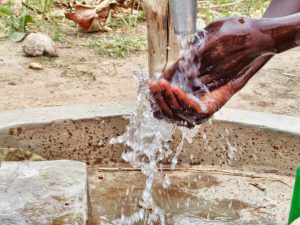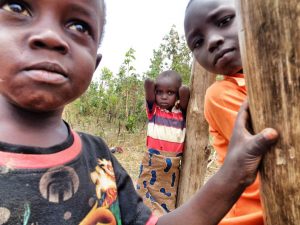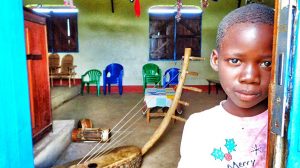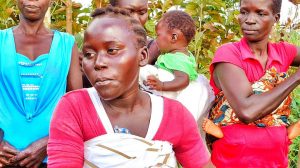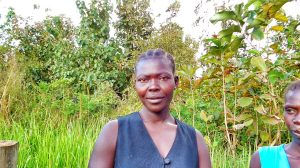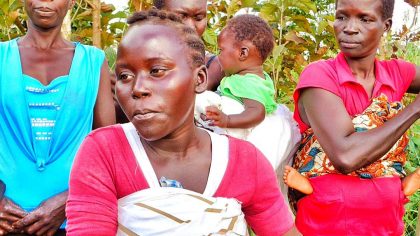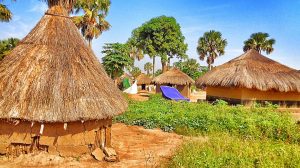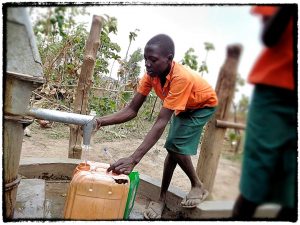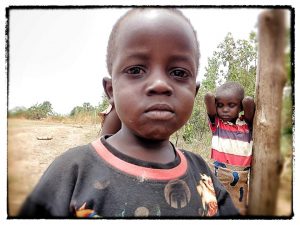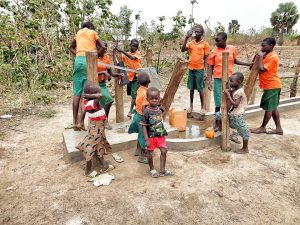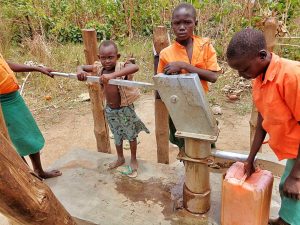his project is made possible through the partnership of Water Charity and the National Peace Corps ![]() Association, working with Water is Basic.
Association, working with Water is Basic.
This is Project 8 of Phase 2 of our South Sudan Well Rehab Program. Phase 1 of the program began with the Tore region, which became the center of a new wave of violence. These Phase 2 projects are being done along the Yei River, of Yei State. We continue with multiple well rehabs in Yei County where many are displaced from the last two years of violence in the Unity and Jonglei States. This project has been COMPLETED. Scroll down to read the #Conclusion Report below.
Location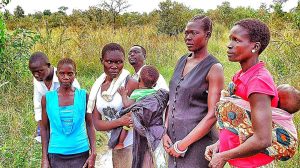
San-Ji-Sari, Yei River County, Yei State, South Sudan
Community Description
San-Ji-Sari resides four miles Southwest of Yei Town. The borehole was originally drilled for refugees, in 1975, along the main road of the village. San-Ji-Sari still mainly consists of refugees and others displaced from a variety of tribes. The community was formed as a result of the first civil wars of Sudan and South Sudan, in 1982. As the wars broke out the community became strictly dependent on farming and hunting.
Problem Addressed
When an orphanage was built in the village, the community’s focus shifted and the main borehole was forgotten. Now that the orphanage has its own borehole, the community is back to focusing on the area’s original borehole. The borehole was immediately overused and lacked 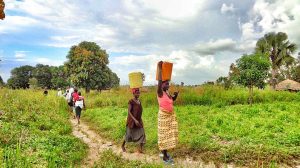 a committee to collect and manage funds for the inevitable borehole breakdown. With many residents relying on farming as their only means for financial gain, very few have had the time to commit to being a part of a committee. Right before the borehole broke; the community finally agreed upon the necessary terms for the borehole and formed a committee. Less than a month later, the borehole broke down and has been in disrepair for the past year and a half.
a committee to collect and manage funds for the inevitable borehole breakdown. With many residents relying on farming as their only means for financial gain, very few have had the time to commit to being a part of a committee. Right before the borehole broke; the community finally agreed upon the necessary terms for the borehole and formed a committee. Less than a month later, the borehole broke down and has been in disrepair for the past year and a half.
Mary Bannia has been a member of the community for four years. She is a wife and a mother to two boys and two girls. She used to fetch water from the local, community borehole, which was close to her home. When the borehole broke, she was forced to move closer to available water, which still puts her a mile away from the closest stream or shallow well. No matter where Mary goes, the water she gathers for her family is stagnant and contaminated. With carrying water on her head and a baby on her back, Mary has begun to suffer from severe pains in her back and legs, as well.
Daniel Malishis the son of divorced parents, and the brother to five siblings. Now living with his mother, Daniel struggles without his father 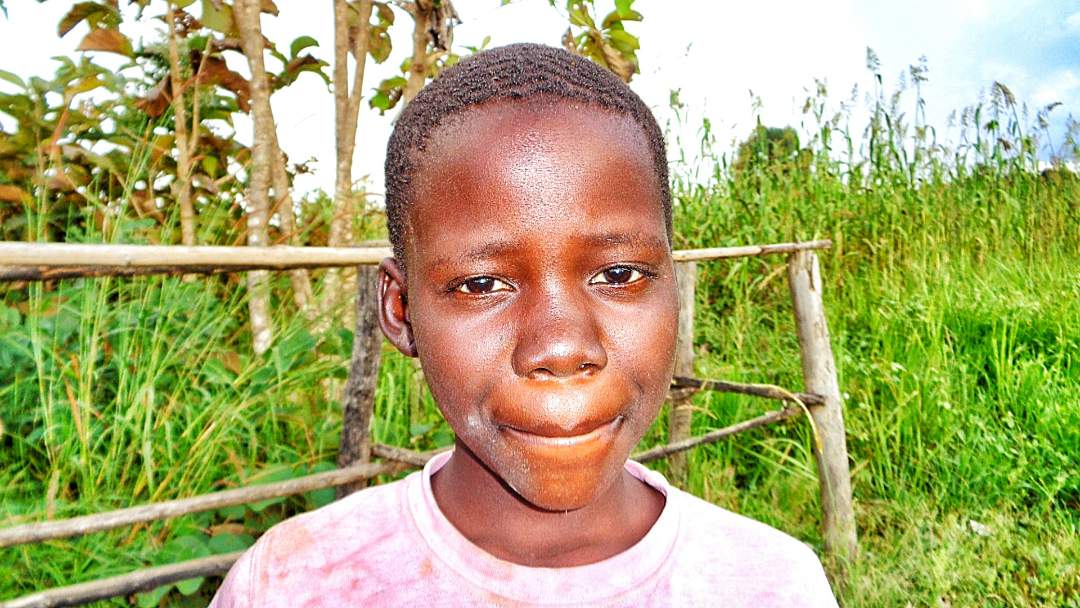 present. The 14-year-old attends the Lutaya Primary School three miles away. He is hoping to move on to seventh grade next year. However, the broken borehole has forced him to wake up two hours earlier than he is used to in order to fetch water for his entire family. Since his father left, his mother is busy attending to the family farm so that she can afford Daniel’s schooling. But with the extended time it takes to gather water for his family, Daniel has been missing his morning classes, decreasing his chances of advancing to the next grade.
present. The 14-year-old attends the Lutaya Primary School three miles away. He is hoping to move on to seventh grade next year. However, the broken borehole has forced him to wake up two hours earlier than he is used to in order to fetch water for his entire family. Since his father left, his mother is busy attending to the family farm so that she can afford Daniel’s schooling. But with the extended time it takes to gather water for his family, Daniel has been missing his morning classes, decreasing his chances of advancing to the next grade.
Project Description
This project will be in collaboration with Water is Basic, a locally owned and operated water drilling company. Over the last 8 years, Water is Basic has been a reliable company in South Sudan, drilling and rehabilitating since 2008. This project should only take days to complete.
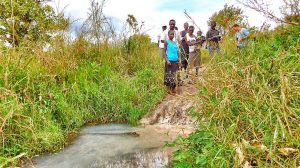
First, the Water is Basic crew will take the pump apart, removing all the pipes to examine and check for holes or signs of future problems. The project will restore the pipes and the head of the borehole to reliable and working order.
Problem Impact
More than 500 people will benefit.
Peace Corps Volunteer Directing Project
Steve Roese
Monitoring & Maintenance
Water Is Basic educates and empowers the community by helping them learn the importance of diverse and equal organization. The water committee becomes a reconciliation tool as mixed genders, tribes and religions work together to manage the community well. By aiding the village in developing a committee, and managing and maintaining their well, the village is able to collect and save money to dedicate to future 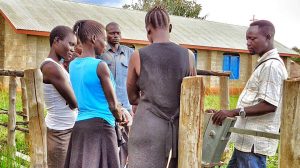 repairs.
repairs.
Comments
After the last war ended in 2011, many refugees returning to South Sudan landed in this particular region of Yei. Because of this, farming became one of the main forms of economic prosperity. With local boreholes, communities are able to provide clean water for domestic use and their crops. Clean water nearby also helps children, who are responsible for gathering the water for their families, stay on track in school instead of spending their time searching for alternative water sources.
Water is Basic is a borehole drilling organization in the Republic of South Sudan. This organization is a Sudanese solution to a Sudanese problem, birthed and led by many of the religious-Sudanese leaders in response to the country’s water crises. All of the projects in this program are designed to develop self-sustaining water systems. Further, these systems are managed and operated by local villages. It is our mission to build communities and empower the Sudanese to implement solutions to their own crises
While not an official Let Girls Learn project, it is in keeping with the goals and objectives of that program, and, as such, falls under Water Charity’s own Let Girls Learn + heading.
This project has been paid for by an anonymous donor. If you wish to see more great projects like this one, please contribute to our South Sudan Well Rehab Program by clicking on the Donate button below.
San-Ji-Sari Well Rehab Project – South Sudan Conclusion
Location
San-Ji-Sari, Yei River County, Yei State, South Sudan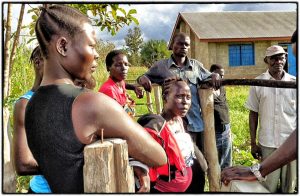
The community of San-Ji-Sari is far from any town. Its members are reliant on small businesses and farming. For many months, the local community had suffered without clean water from the underground aquifers. The pupils who also utilize the borehole have been forced to go to school further away, putting them at greater risk of being attacked or kidnapped. So, Water Charity & Water Is Basic joined forces to have the borehole and pump repaired. This was accomplished successfully a couple of months ago in a window of opportunity during which the fighting in the region had slowed to a near standstill.
Project Description
The problem with the borehole was a result of a broken cylinder and GI Pipe. After four hours of hard work, the original pump was back in working order, and the villagers once again had a local source of clean water.
Project Impact
Within a short amount of time of the borehole repair, leaders throughout the community said they could already tell the difference in the health of the local residents. Stale and contaminated water diseases have been responsible for killing the majority of the population before they reach the age of five.
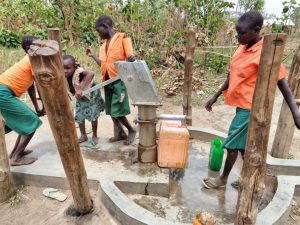 Since this borehole also provided water to a nearby school, made up of over 100 pupils, parents who moved their children to schools farther away from the village are beginning to send their children back to their original school. This further guarantees the children’s safety, as they no longer have to travel as far as education.
Since this borehole also provided water to a nearby school, made up of over 100 pupils, parents who moved their children to schools farther away from the village are beginning to send their children back to their original school. This further guarantees the children’s safety, as they no longer have to travel as far as education.
Robert, a pupil at the nearby school, says how relieved he is that he doesn’t have to return all the way home for water between classes. Now he has nothing standing between him and the rest of his education.
All in all another successful well rehabilitation in the southern area of South Sudan. With this Phase 2 of the program completed and a new Phase 3 being implemented already, the number of villages who have clean water now has multiplied dramatically to well over 50. Furthermore, once the villages have a working well, the population of these villages is exploding as refugees and internally displaced people gravitate to such villages with their families. We have seen many villages of 500 blossom to 2000 or more in a matter of months. It is hard to say how many of the war refugees and displaced people will stay in these villages when/if their home villages become safe again. But it is certain that people want to live where there is water.
